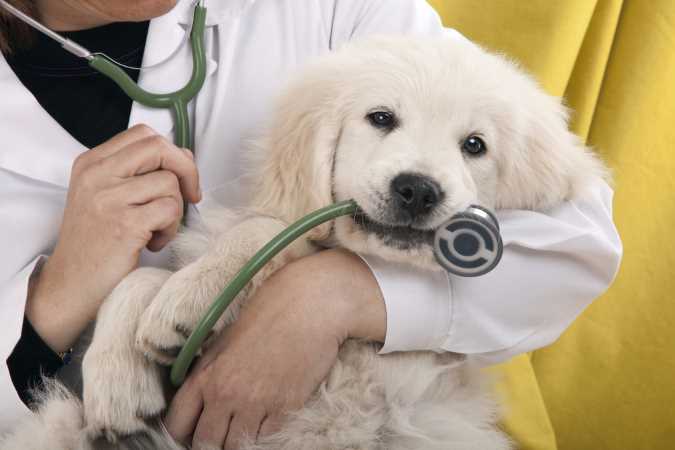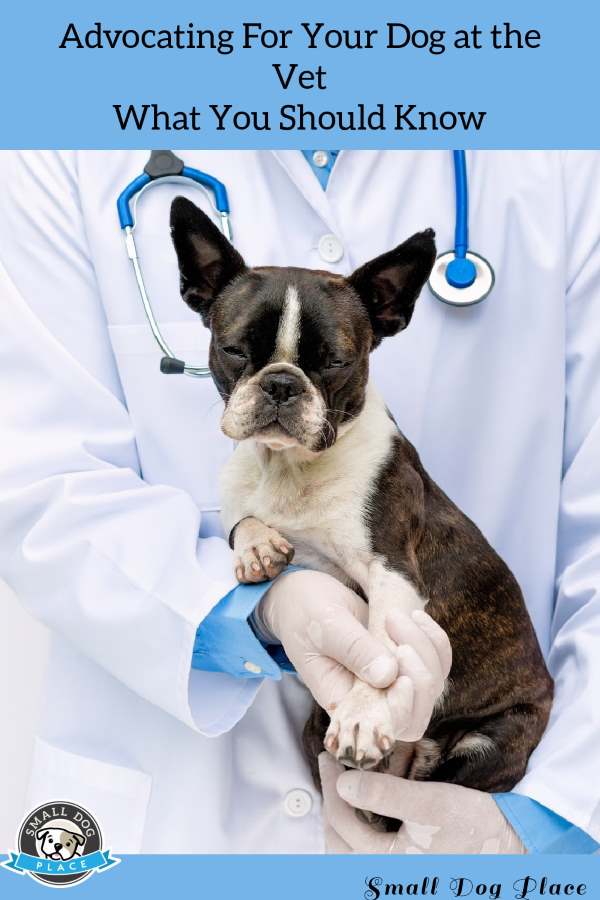Advocating for Your Dog By Nicole McCray |Published 03-04-2021
One of your worst nightmares has become a reality. Your dog is sick, and you don’t know what’s wrong. You’ve noticed that he’s losing weight, sleeping more than usual, or just not acting like himself. Or, maybe his symptoms are more obvious, such as vomiting or diarrhea.
So, now you’re sitting in the waiting room at your vet’s office feeling anxious, stressed, and worried. And you’re not alone. Our dogs are part of the family, and it’s scary when they’re sick.
It’s no surprise that you might feel a bit helpless… and even a bit intimidated by the staff at your veterinary hospital.
 Advocating For Your Dog at the Vet
Advocating For Your Dog at the VetNaturally, you want the best care possible for your fur baby. You want to leave the office knowing that everything that can possibly be done is being done. The best way to do this is to become your dog’s medical advocate during vet appointments. Here’s what you need to know.
What does it mean to be your dog’s medical advocate?
Advocating for your dog at the vet means doing all you can to arm yourself with the information you need to make the best decisions for your pet.
It means being actively involved in the decision-making process, rather than just sitting back and letting the staff do what they think is best. Consider what your pet would want, as well as what’s best for your own peace of mind.
Don’t Put the Vet or the Staff on a Pedestal
Don’t let the white coats, medical scrubs, and big words intimidate you. At the end of the day, the staff at your veterinary hospital are just people. Obviously, you want to be respectful, but don’t put them on a pedestal.
The professional and sometimes intimidating environment of the office doesn’t make them superior. Advocating for your dog at the vet requires comfortable, two-way conversation. If you allow yourself to be intimidated, you won’t feel comfortable voicing your opinion.
You might be surprised to find that your vet appreciates your active interest in your pet’s treatment. And, if he doesn’t, it’s probably time to look for a different vet.
Talk to the Vet
Your vet knows how important your dog is to you, and a good vet will be empathetic to your concerns. Sharing your concerns creates a mutual bond of trust between the two of you that’s incredibly important.
Are you concerned about finding money to pay for the treatment? Discussing finances is never easy, but being upfront is essential. He might be able to offer a pared-down treatment plan that will save you money on vet bills. He might even have medication samples he can give you for free to help keep costs down. You never know until you ask.
Or, maybe you’re scared your dog won’t wake up from anesthesia. Or that he’s terminally ill. Or maybe your family is pressuring you to put the dog to sleep, but you’re just not ready. Whatever your concerns are, could you share them with the vet?
Talking about your concerns and getting your vet’s input will help you make the best decisions for you and your pet.
Be Present When Your Dog Is Examined and Treated
Being your dog’s medical advocate requires a face-to-face conversation with the vet. A phone call or email after your pet is examined isn’t good enough. Being present when your dog is examined allows you to look at any x-rays, discuss test results, and mention any symptoms your vet might be overlooking.
It also allows you to discuss any medications, tests, or treatments before they’re administered. And, when you think about what your dog would want, you know that he would like you to be there with him.
Don’t have someone else take him in for you. Avoid dropping him off in the morning, and pick him up later unless you’ve already had a face-to-face discussion ahead of time. If you absolutely can’t be present during the examination or treatment, request a discharge appointment with the doctor so you can talk face to face about his findings and recommendations.
If your dog is very sick, it would be helpful if all decision-makers can be present during the examination. That way, you can all ask questions and discuss treatments in real-time. If this isn’t possible, consider recording the conversation or at least taking notes so that your decision-making partner is as well informed as you are.
And finally, it should also go without saying that you should turn your phone off before entering the appointment. If the kids are a distraction, try to avoid bringing them with you. You can’t be an effective advocate for your dog if you aren’t truly there during the appointment.
How to Be Present During COVID-19
That said, we are currently experiencing an unprecedented situation due to the COVID-19 pandemic. Your vet may not allow you inside the building, much less the treatment room, for their safety, and that’s completely understandable.
If you are asked to wait in the parking lot while your dog sees the vet, you can still be present at the appointment by phone or even video chat. Just let the staff know that you want the vet to call your cell phone when he begins his examination.
If possible, give the staff a heads up when you make your appointment and remind them when they come to get your dog. The staff is likely used to this request, and it shouldn’t be a problem.
However, if they refuse to accommodate you or make you feel uncomfortable, you are well within your rights to cancel the appointment and seek treatment elsewhere.
Prepare to Provide as Much Information as You Can
Your vet needs to know your dog’s medical history. Not just what’s in his file at the clinic, but anything you’ve noticed that may indicate he’s not feeling well. This information is precious for proper diagnosis.
Tell your vet if you’ve noticed any changes in appetite, thirst, behavior, energy, or bathroom habits. Report any sneezing, coughing, diarrhea, and vomiting. Do some investigating around your home before the appointment. Is there something your dog might have gotten into that could be contributing to his symptoms?
Gather these things ahead of time, so you’re prepared to provide your vet with as much information as possible:
Diet
Know the exact brand of food your dog is eating, how much, and how often. Make a note of any recent dietary changes or changes in his eating habits.
Medications
Never assume that your vet knows what medications your dog is taking. Be ready to provide the exact name, dosage, and frequency of any medicine or supplement you are giving your dog.
Medical History
Know your dog’s medical history, especially if you’re visiting a new clinic that doesn’t already have this information on file. Be ready to provide vaccination records, past test results, x-rays, and medical records for your previous vet. Have a concise list of medical events that have occurred at home as well, such as seizures, unexplained weight loss, or changes in urinary or bowel habits.
Be Honest with the Vet
Always be honest with the vet, even if it’s embarrassing. We promise they’ve heard it all before. Whether your dog ate condoms out of the trash or fell out of the back of the truck because he wasn’t adequately secured, you must get over your embarrassment and tell the vet.
Confessing these things to the vet, no matter how awkward it is, could save your dog’s life by allowing your vet to act swiftly instead of trying to figure it all out on his own.
Tell the Vet if You’re Confused
You can’t be a good advocate for your dog if you’re confused about what the vet is telling you. It’s not uncommon for doctors to use medical terminology when speaking to clients, simply out of habit. You need to speak up and tell them if you’re confused so they can explain better.
Ask the vet to show you exactly what he’s talking about in the x-ray or on the lab report. Any time you don’t understand, ask for a pause and get clarification.
Advocating For Your Dog Means Asking Questions
The best way to be your dog’s advocate at the vet is to ask lots of questions. Don’t count on remembering what you want to ask during the appointment when a lot is going on. It pays to write down a list of important questions beforehand.
But even more than that, don’t hesitate to ask more questions later on. Once you’ve talked to your partner, done some research on your own, and processed everything you learned at the appointment, you’ll probably have a whole new list of things to ask, and that’s fine.
If the doctor is busy when you call in with your question, ask the staff to have him call you when he has time to talk. Or, don’t be afraid to request a follow-up appointment if you feel like it’s justified.
You Are Entitled to a Second Opinion
It never hurts to get a second opinion. Each vet will have a different approach and perspective that may help you make a more informed decision. That doesn’t mean that you don’t trust your vet, it just means that you want to gather as much information as possible before moving forward.
On the other hand, maybe you have a gut feeling that your vet isn’t giving you the best advice. Perhaps his recommendations aren’t matching up with your research. Or, maybe the advised treatment isn’t working, and your dog isn’t getting better, or he’s even getting worse.
Or, maybe you love your conventional vet, but you would also like the opinion of a holistic vet who prefers natural, less invasive treatment methods.
Whatever the reason, you are always entitled to a second opinion. And, getting a second opinion is part of advocating for your dog. If your vet gives you a hard time about it, he’s not the vet for you.
Advocating For Your Dog: Pin for Future Reference

Advocating for Your Dog: Wrapping Things Up
The most important aspect of advocating for your dog at the vet is to be informed. If your vet is recommending a treatment or vaccine that you don’t know anything about, take the time to do your own research so you can weigh the benefits and risks before moving forward.
For example, maybe your vet automatically vaccinates patients for canine influenza, but your dog is a homebody who’s never exposed to other dogs. According to your research, having the vaccine isn’t necessary and could even pose risk to your dog if he has a reaction. Once you’re armed with this knowledge, you can tell the vet you’re opting out.
The biggest mistake you can make is blindly following the vet’s advice without being informed. Look at it this way. The staff at your veterinary hospital is your dog’s medical team, but you are the team captain.
Advocating For Your Dog: Author Bio
Nicole is a die-hard animal lover who has worked in pet care for years. She is a former vet technician, a dog mom to her two rescue pups, and she grew up living and working at her family’s pet boarding facility.
She loves using her writing talents to share the insight she’s learned throughout her career in the hopes that her knowledge can help other pet parents out there!
Did you find Advocating for Your Dog Helpful?
Does This Article Deserve Your Thumbs Up?
We always appreciate your support and encouragement. Your thumbs up means so much to us. Please like this article.
If you find this page or any page on Small Dog Place Helpful, or Useful in anyway, I’d love it if you would click the small heart found on the bottom right of each page.
You can also share or bookmark this page — just click on the:

Free Monthly Newsletter
Sign Up for Our Free Newsletter and get our Free Gift to You.
my E-book, The Top 10 Mistakes People Make When Choosing a Dog (and how to avoid them)
If you enjoyed this page, I’d love it if you’d let me know. Just click the button below. Thank you.
Sharing is Caring


